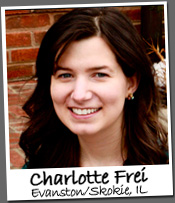By day, Charlotte Frei is a graduate research assistant at Northwestern University in Evanston, Illinois. But after school, she leads middle school students in experimental design activities as part of the Materials Science Research Engineering Outreach program.
Q: Tell us about the program you work with. The program engaged 7th and 8th grade students after school once a week in experimental design activities. Over 24 weeks, students explored three engineering disciplines (eight weeks each) with Northwestern graduate students. Each unit consisted of three weeks of exploration of a topic followed by four weeks of some kind of design. The final week was a fun activity designed by us. The three units vary from year to year, but for 2011-2012 they were food chemistry, biomedical engineering and materials science engineering. Q: What made you want to get involved with this program? I thought it sounded fun and would be a good way for me to improve my understanding and communication of scientific ideas. Q: How much time do you spend volunteering? About three hours each week Q: What's the most fulfilling part about volunteering with the afterschool program? The last week, I came up with a fun activity and all the students who had previously been bored (obviously forced by a teacher or parent to participate in this club) were having a good time. I like to think that their enjoying only 5% of the activities could still lead to a career in science—if you can make them see how relevant, fascinating and omnipresent chemistry is, for example, not just something just for men in white coats under fluorescent lights. Q: What's the most challenging part? Getting teenage girls to put away their cell phones and keeping them interested in general when some of the concepts seem too abstract and unrelated to their day-to-day goings on. Q: What advice would you give to other professionals thinking about volunteering with an afterschool program? Make it relevant—show them how their lives are affected every day by scientific discovery and all the “cool” opportunities there are in a career in a STEM discipline. Q: What advice would you give to young people about studying STEM? If you want to solve a social, political or economic problem, studying STEM fields will give you the analytical tools you need to do so. STEM careers aren’t devoid of art or literature either—there is plenty of mystery and thrill in nature and physics to inspire anyone in any career. I think, fundamentally, all people in all careers are trying to understand themselves and one another, and a STEM education teaches you to do so methodically. | 







